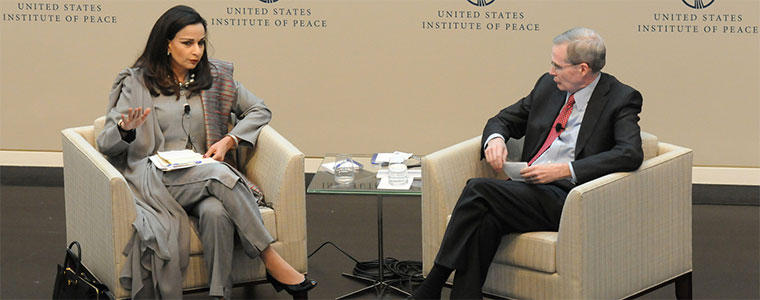A Conversation With the New Ambassador of the Islamic Republic of Pakistan to the U.S., Ambassador Sherry Rehman
On February 15, USIP hosted Ambassador Sherry Rehman, the Islamic Republic of Pakistan’s Ambassador to the U.S., for a conversation on Pakistan and the Pakistan-U.S. relationship. This discussion, Ambassador Rehman’s first public speaking engagement to a Washington policy audience since her arrival in Washington, also marked the first time a Pakistani official has spoken publicly in Washington since the November NATO airstrike on a Pakistani border post that killed 24 Pakistani soldiers.
Read the event coverage, Amb. Sherry Rehman: The U.S. and Pakistan – Time for a Reset

This past year has seen U.S.-Pakistan relations steadily deteriorate following a series of incidents, including the Raymond Davis affair in the beginning of 2011, the May 2nd killing of Osama Bin Laden by U.S. forces in Abbottabad, and the September Senate testimony of then Chairman of the Joint Chiefs, Admiral Mullen, that the Haqqani network was “a veritable arm of Pakistan’s Inter-Services Intelligence agency.” The relationship hit a new low following a November border incident in which 24 Pakistani soldiers were killed by NATO air strikes. Pakistan responded by shutting down the all-important NATO supply route and downgraded diplomatic engagement as its parliament initiated a thorough review of the bilateral relationship. All eyes are now set on the recommendations of this parliamentary review which are due any day and are expected to propose a “reset” of the U.S.-Pakistan relationship on new terms. The outcome is important given Pakistan’s critical role in Afghanistan and its long term importance for stability in the South Asian region. With one of the world's largest populations, a crucial geo-strategic location, and potential to develop into a moderate, prosperous state, Pakistan remains a major player in South Asia's future.
Meanwhile, Pakistan appointed a new envoy, Ambassador Sherry Rehman, to the United States on the heels of the controversial “memogate” incident that created a stir both in Islamabad and Washington. Ambassador Rehman has recently arrived at what is being seen as a defining moment in the U.S.-Pakistan relationship.
USIP was honored to host Ambassador Rehman for her first public speaking engagement to a Washington policy audience since taking over as her country’s envoy to Washington. She discussed the state of the U.S.-Pakistan relationship, why Pakistan felt a “reset” of the relationship under a different set of conditions was necessary, and Pakistan’s role in the region going forward. The event marked the first time a Pakistani official has spoken in Washington since the NATO air strike.
This event featured the following speakers:
- Ambassador Sherry Rehman
Ambassador Extraordinary and Plenipotentiary
Islamic Republic of Pakistan - Tara Sonenshine, introductory remarks
Executive Vice President
United States Institute of Peace - Stephen J. Hadley, moderator
Senior Adviser for International Affairs
United States Institute of Peace
Explore Further
- Amb. Sherry Rehman: The U.S. and Pakistan - Time for a Reset
Event News Feature | February 16, 2011 - Read Ambassador Rehman's prepared remarks [external link]
- Learn more about USIP's work in Pakistan
- Pakistan’s Future: Uncertainty and Hope
Event News Feature | November 23, 2011 - Read the Peacebrief, "Pakistan, the United States and the End Game in Afghanistan: Perceptions of Pakistan's Foreign Policy Elite"



